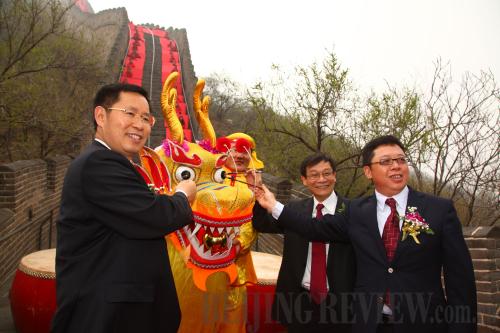|
 |
|
MEDIA APPEARANCE: Xia Donglin (center), an independent director of Yonyou Software Co., attends a ceremony to unveil the company's new logo on April 23, 2012, along with Board Chairman Wang Wenjing (left) and director Wu Zhengping. Yonyou is a leading enterprise management software and cloud service provider in the Asia-Pacific region (XINHUA) |
The issue of independent directors in China has come under the spotlight recently, following the removal of two from office.
On May 29, Hangzhou Tianmushan Pharmaceutical Enterprise Co. in east China's Zhejiang Province announced that its restructuring plan had been delayed again. Before that, the Shanghai Stock Exchange-listed company fired two of its independent directors—Zheng Lixin and Xu Zhuangcheng, who questioned the validity of the company's finances and voted against the proposed restructuring, which mainly involved the acquisition of a pharmaceutical e-commerce website. The dismissals led to the inquiry from the Shanghai Stock Exchange requiring the company to explain its actions.
"The incident has brought independent directors to the fore once again—it is apparent they are not really 'independent' in Chinese companies," said Song Yixin, a securities lawyer with the Shanghai Newhope Law Firm.
Whole new role
An independent director differs from an executive director who holds shares at a listed company. Independent directors do not have a material or pecuniary relationship with their company or related persons, with the exception of compensation paid to them. Their major task is to supervise the board of directors.
The independent director system originated in the United States during the 1930s, and has played an increasingly important role in the corporate governance practices of companies in Western countries since.
China formally introduced the independent director system in 2001.
A regulation issued by the China Securities Regulatory Commission in August 2001 defined an independent director as "a director who does not hold any position in the company other than director and who has no relationship with the listed company or its principal shareholders that could hinder them in making independent and objective judgments."
The system of independent directors is intended to improve corporate governance, protect the interests of small and medium shareholders and enhance transparency at listed companies, according to the regulation.
In accordance with the document, independent directors are authorized to submit proposals to assemble shareholders meetings, recruit or dismiss accounting firms, invite independent auditors and offer independent financial reports apart from their normal duties as board members. They are also free to give independent opinions on major transactions with affiliated institutions, on assignment and payment of the managerial staff and to object in cases where the interests of smaller shareholders might be hurt.
In October 2005, the Standing Committee of the National People's Congress, China's top legislature, adopted an amendment to the Corporate Law, which formally clarifies the legal status of independent directors.
"The system is aimed at constraining the power of management and better protecting the interests of minority shareholders. But its role has not properly implemented as China's listed companies are usually controlled by a single majority shareholder," said Liu Jipeng, Director of the Capital Research Center at China University of Political Science and Law in Beijing.
By convention, to become an independent director, one should first be examined for qualifications for the post and then be nominated by the company before being voted in at a shareholders meeting, said Liu Guohua, head of the Guangzhou-based Benben Law Firm in south China's Guangdong Province.
However, most independent directors in China are actually recommended by the largest shareholders, which inevitably undermines their independence.
"Independent directors seldom dare to vote against those largest shareholders' decisions," said Dong Dengxin, Director of the Finance and Securities Research Center with Wuhan University of Science and Technology in Wuhan, central China's Hubei Province.
According to a report from the Shanghai Stock Exchange, only 38 independent directors across 26 companies raised objections to relevant company matters in 2011.
"Instead of inviting qualified and competent professionals to serve on their board, many public firms hire someone who will take their money and become a yes-man," Liu said.
Liu said that much of Chinese public companies' misconduct can be attributed to problematic corporate governance. He added that a public company is vulnerable to power abuse by a controlling shareholder—usually those who run the company—when independent directors do not do their job well.
| 